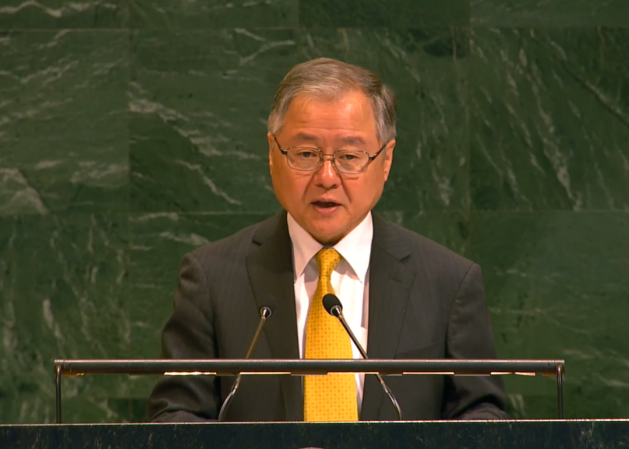矯正施設の課題に関する国連総会ハイレベル討論における梅津大使ステートメント
令和7年6月13日

(As delivered)
Thank you, Mr. President.
The ultimate purpose of imprisonment is to protect society from crime and to prevent recidivism. Yet, challenges such as overincarceration and the serious neglect of conditions are undermining the role of prisons in criminal justice systems. This has immense financial and socioeconomic costs, as well as ramifications across public safety, health and human rights.
Under these circumstances, the principles of the Nelson Mandela Rules provide clear guidance on upholding the safety and human dignity of prisoners, including the concept of dynamic security, which each country can consider applying while taking into account the actual circumstances of its own country. From this perspective, Japan organizes annual training programmes to address offender treatment and rehabilitation challenges at UNAFEI highlighting prison-related international standards, including the Nelson Mandela Rules, with participants from Asia, Africa, and Latin America. The concept of human security, which focuses on dignity and empowerment, can further catalyze reform efforts.
To promote respect for the rule of law and human rights, Japan, as the leading country of the Tokyo Rules, has continuously served as a member country of the CCPCJ since it was established in 1992, actively engaging in various issues, including penal reform and reducing reoffending.
Last month, the new UN Model Strategies on Reducing Reoffending, known as the "Kyoto Model Strategies," was adopted by consensus in the CCPCJ, which transforms the bold commitments made during the Kyoto Congress into concrete, transformative action. Japan, as the host country of the Kyoto Congress, reaffirms our unwavering commitment to take active and strong leadership in the implementation of the Kyoto Declaration.
In conclusion, Japan is determined to work together with the international community to strengthen our efforts for crime prevention and criminal justice and build a safer and fairer world for generations to come.
I thank you.
The ultimate purpose of imprisonment is to protect society from crime and to prevent recidivism. Yet, challenges such as overincarceration and the serious neglect of conditions are undermining the role of prisons in criminal justice systems. This has immense financial and socioeconomic costs, as well as ramifications across public safety, health and human rights.
Under these circumstances, the principles of the Nelson Mandela Rules provide clear guidance on upholding the safety and human dignity of prisoners, including the concept of dynamic security, which each country can consider applying while taking into account the actual circumstances of its own country. From this perspective, Japan organizes annual training programmes to address offender treatment and rehabilitation challenges at UNAFEI highlighting prison-related international standards, including the Nelson Mandela Rules, with participants from Asia, Africa, and Latin America. The concept of human security, which focuses on dignity and empowerment, can further catalyze reform efforts.
To promote respect for the rule of law and human rights, Japan, as the leading country of the Tokyo Rules, has continuously served as a member country of the CCPCJ since it was established in 1992, actively engaging in various issues, including penal reform and reducing reoffending.
Last month, the new UN Model Strategies on Reducing Reoffending, known as the "Kyoto Model Strategies," was adopted by consensus in the CCPCJ, which transforms the bold commitments made during the Kyoto Congress into concrete, transformative action. Japan, as the host country of the Kyoto Congress, reaffirms our unwavering commitment to take active and strong leadership in the implementation of the Kyoto Declaration.
In conclusion, Japan is determined to work together with the international community to strengthen our efforts for crime prevention and criminal justice and build a safer and fairer world for generations to come.
I thank you.
